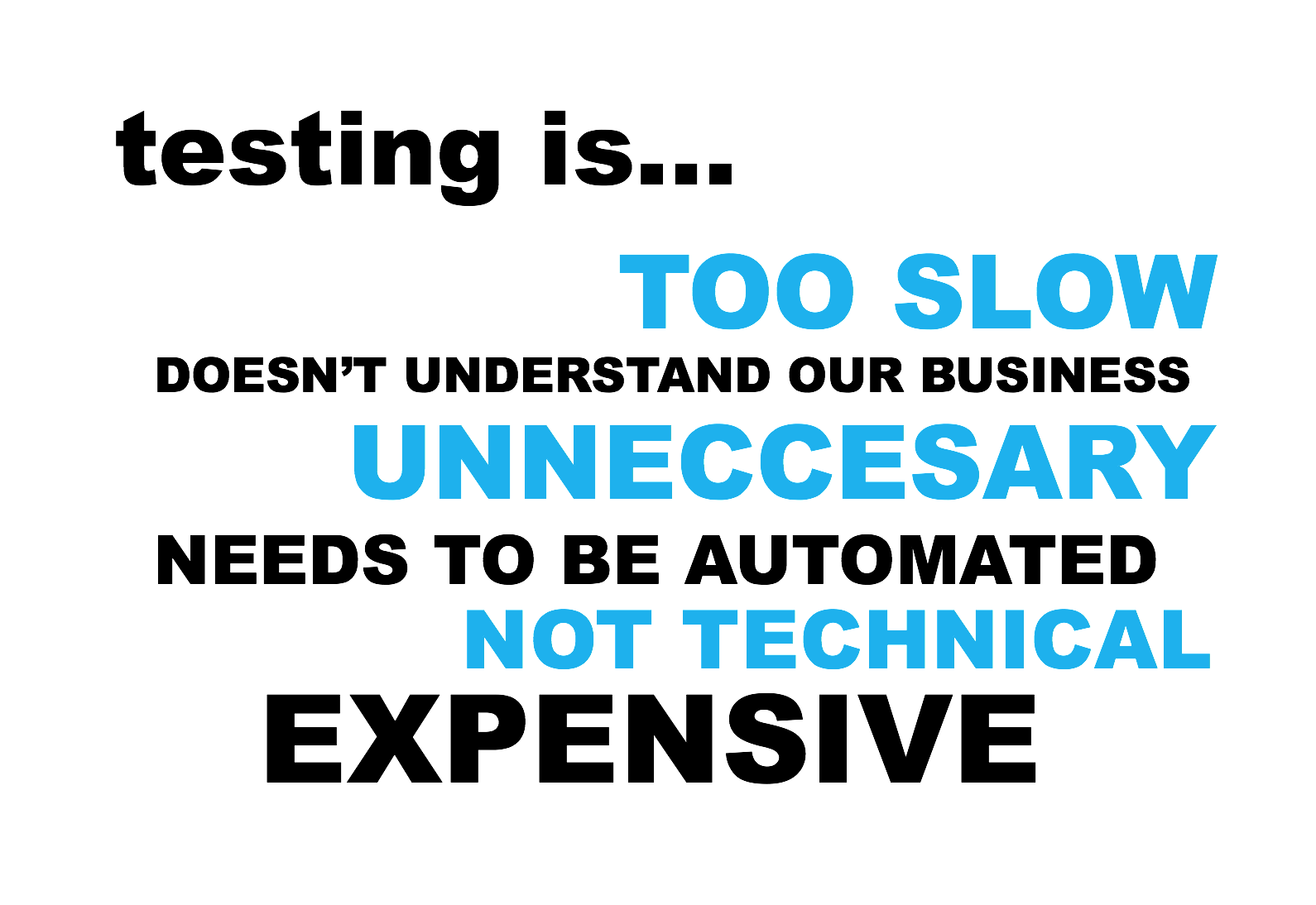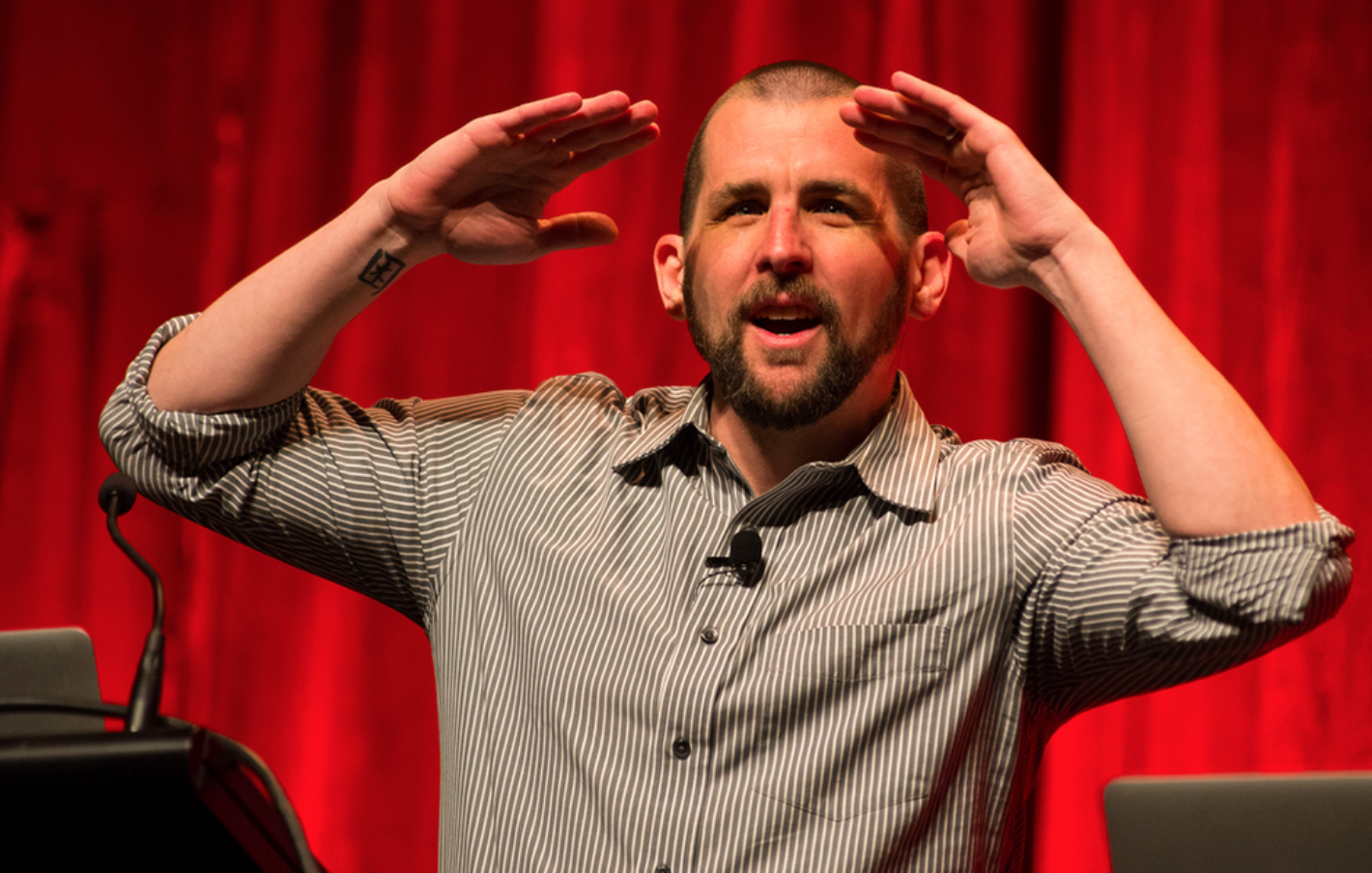Enjoy this in the April 2016 issue of Testing Trapeze!
“Find a problem you care about and focus on fixing that.” – Scott Berkun
Software testing is a strange business. It’s commoditized, devalued, misunderstood, and goes through cycles of being chopped, changed, and lives at the front lines of imminent takeover by our robot overlords. Why anyone would want to be a professional software tester is even harder to understand.
After over 20 years in this business, I’ve seen people from all stripes and walks of life wander in and out of this industry, but the ones that stick with it all have one thing in common: they are slightly nuts. Sure, they might seem sane – they are probably well read, hold a job, support a family – all the makings of normality, but inside, some part of them is just a little bit crazy.
Frankly, you’d have to be crazy to do this for a living! Testers spend their days trying to figure out what “might” go wrong by looking for ways a product is already broken – staring into the cosmic abyss of the impossibility of complete testing for all of us takes it toll. All the while competing in an industry teeming with unenlightened vendors, consultants and “experts” undermining their own value proposition by selling “bug free” methodologies, certified super-tester training programs and “automated algorithmic defect predictonators”.

Let’s go to a testing conference!
Further to that, a large part of our business is filled with people who lack any intellectual curiosity about our craft. Jerry Weinberg famously said “a tester is someone who knows things can be different”, but in my opinion, that seems to have been interpreted as a sirens call for every “different” person in technology who couldn’t fit in anywhere else. I have frequently used the analogy that most enterprise “QA” departments are created by tipping the building on its side and drawing a line around everything that’s loose and rolls down to one end. On top of that the desire to farm out software testing to the lowest bidder has been accelerated through outsourcing, offshoring, and labor arbitrage and greased the slide to the bottom of the talent pool.
All this used to bother me.
Every couple of years or so, I seriously consider getting out of the software testing business altogether. I get frustrated by the industry and the same tired ideas being blasted into the echo chamber by a new crop of “thought leaders”. Nothing ever seems to change in our business. I have a slide in one of my presentations that I keep waiting to be irrelevant, but for years now its just as indicative of attitudes about testing as it was when it was first written.

As relevant as ever…
Now I’m not saying I’ve stopped caring about professionalism in testing and managing it like a skilled craft, or all the other improvements I’ve been talking about for decades that we can make in our business. But something happened recently that made me rethink my attitude towards testing, our industry, and its place in technology. QASymphony just held its annual users conference and made the wise decision to have Scott Berkun give the keynote on his book “The Myths of Innovation”. Scott is a pretty impressive guy and he’s not a software tester, so I was very interested in the parallels he would draw between innovation and our business. I’m not going to go into every detail of what Scott spoke about (I would highly recommend you read the book and watch the video), but one thing stood out when he was talking about explorers.
Why is an explorers’ life always difficult? Because they are an explorer! Why did Magellan die while trying to circumnavigate the globe? Because he was trying to circumnavigate the globe in the 16th century, dummy! Why is a testers life so hard? Because testing is hard! And to be really good at it – to choose it as a career – is going to take a person that likes that type of challenge and is well, probably a little bit nuts. People also like to believe simple narratives that tie a bow around difficult ideas and ignore the hard work of experimentation and failure essential to discovery. That explains why our industry is filled with lots of bad actors making all our lives harder, like modern day astrologist charting easy and mystical answers to complex problems. And that also explains why it’s not going to change.

I once found a hole in your logic THIS BIG!
That my friends, is when the Buddha started laughing. I’m never going to stop working to improve the state of software testing, but I’ve been wrong about why it’s constantly in a state of repair. It’s not because testing is the lowest totem on the pole that we have these problems – it’s because it’s so difficult to do right that people are willing to believe there are shortcuts to success. The very nature of what we are trying to do is going to attract difficult people and snake oil salesmen selling star maps. Testing is hard. Doing it right is very hard. An ambiguous, unchartered journey into a sea of bias and experimentation, but as the line from the movie goes, “the hard is what makes it great”.
And that’s why we love it.
Pingback: Testing Bits – 4/10/16 – 4/16/16 | Testing Curator Blog
Keith,
Admittedly I didn’t read the whole post. Didn’t need to, I’ve lived it for the past 29 years. And I’ve had a love/hate relationship at times with my profession. You are correct about being slightly crazy. You do need a warped sense of humor to survive, and bit of a Rodney Dangerfield complex (“I tell ya, no respect… no respect.”) as well. Nuff said.
Thanks Jim – it’s a strange tribe we belong to, but its our tribe… 🙂
Pingback: Reading Recommendations # 59 | Adventures in QA
Oft I am struggling with being different, so your relation to Magellan helps me to relax. We are pioneers of testing craft 🙂
Thank you for video link!
Thanks Kristine – the whole thing about exploring is that you don’t know whats going to happen! Its taken me a long time to learn to love that element…thanks for the comment! 🙂
Pingback: The tester I'll strive to be - ...making software suck less
This article resonated with me, and why I entered the profession. I heard that testing was hard, and when given a choice between two roles, I chose testing because I wanted to find out firsthand if it was hard.
Once I started, I realized that we could have run a infinite number of tests, and still have work to do, but only had a finite amount of time to do it. The intellectual challenge of doing the best we can, in shrinking amounts of time, is what keeps me in this game.
Thanks John! Totally agree, the intellectual challenge of this job keeps me in it as well…cheers! – KK
Dude, you called me little bit nuts and crazy and I must thank you for the compliment.
‘Testing is hard. Doing it right is very hard. It is an ambiguous, unchartered journey into a sea of bias and experimentation’..and this is where all the fun is!! I bet Magellan loved the challenges of exploration. He was a bit crazy, like we are!
Great work mate! Thanks for the article & the link.
Haha! It wasn’t personal! Thanks Rajesh…! 🙂
Great Article !! Thanks for the video. 🙂
Pingback: What We're Reading This Week: May 2nd | Kanoah
Pingback: 5 Ways To Be a Bold and Confident Software Tester – Neotys Testing Roundup
Read it twice and I can’t stop myself nodding.
saved it for future reference, it covers two things I have not been able to see till date:
1. Testers who have chosen testing as profession are likely a bit nuts.
2. Testers have to be crazy enough to love testing.
Thank you for sharing Keith
Pingback: Happy Holidays and 2022 Testers! | Quality Remarks
Keith, this article is as relevant now as it was in 2016, that scares me a little bit. But you are bang on with everything you say!
Thanks Simon, it’s a little depressing but on the bright side, I guess it’s job insurance? 😀